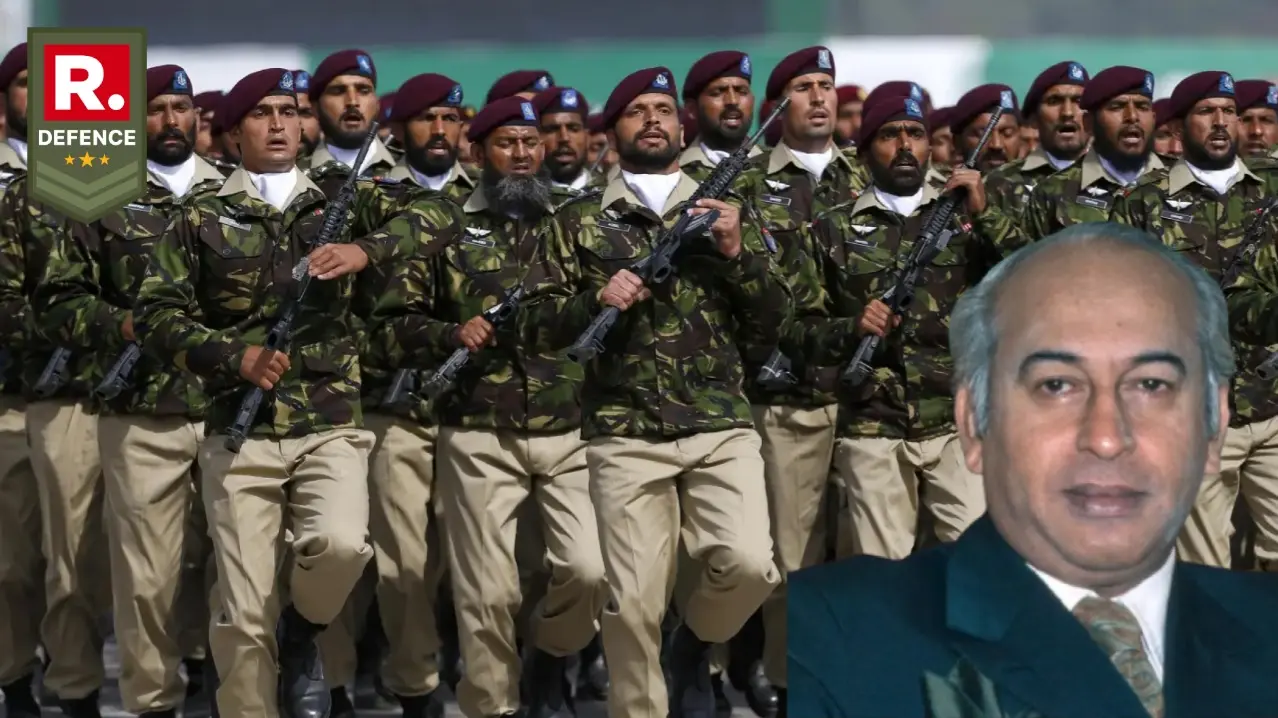Updated 4 April 2025 at 12:35 IST
Zulfiqar Ali Bhutto's Journey From Gallows to Glory—The Hypocrisy of Pakistan’s Military Establishment
On April 4, 1979, Pakistan’s first elected Prime Minister, Zulfiqar Ali Bhutto, was hanged by the military regime of General Zia-ul-Haq.
- Defence News
- 4 min read

Lahore, Pakistan - On April 4, 1979, Pakistan witnessed the judicial execution of its first democratically elected Prime Minister, Zulfiqar Ali Bhutto. Sent to the gallows under the military rule of General Zia-ul-Haq, Bhutto’s hanging remains one of the most controversial episodes in Pakistan’s history—a stark reminder of the establishment’s ruthless suppression of political dissent.
Decades later, the same Pakistan Army that orchestrated his removal posthumously awarded him the Nishan-e-Pakistan on March 23, 2025, exposing its convenient shifts in allegiance when it suits its political and institutional interests.
Bhutto’s Rise and Fall: A Political Murder
Zulfiqar Ali Bhutto, the founder of the Pakistan People’s Party (PPP), rose to power in 1971, leading the country in the aftermath of its humiliating defeat to India in the Bangladesh Liberation War in 1971. His socialist-leaning policies, nationalization drive, and populist rhetoric won him mass support, but they also made him a target for Pakistan’s powerful military establishment. After a coup in July 1977, Bhutto was ousted by General Zia-ul-Haq, who promised early elections but instead imposed martial law.

In 1978, Bhutto was sentenced to death in a politically motivated trial for allegedly ordering the assassination of a political opponent. The Supreme Court of Pakistan upheld the controversial verdict, despite strong international condemnation, including appeals from world leaders. On April 4, 1979, Bhutto was hanged in Rawalpindi Central Jail, cementing Zia’s dictatorship and signalling the military’s absolute control over Pakistan’s political landscape.
Advertisement
Parallels with Imran Khan and General Asim Munir’s Power Grab
Pakistan’s power struggle in 2024-25 echoes the fate of Bhutto. Imran Khan, the country’s former Prime Minister, faced a similar downfall when he was ousted from office in 2022 through a no-confidence vote. His defiance of the military establishment, much like Bhutto’s, led to his persecution. The military-backed government, under General Asim Munir, has since cracked down on Imran’s party, the Pakistan Tehreek-e-Insaf (PTI), imprisoning leaders, suppressing protests and using the judiciary as a tool for political control.

The irony is glaring—while Bhutto was executed for opposing the military regime of his time, Imran Khan is being systematically silenced for resisting the deep state’s authority today. The same playbook of political intimidation, judicial manipulation, and suppression of dissent continues under Pakistan’s military-backed leadership, proving that the establishment’s lust for power remains unchanged.
Advertisement
Nishan-e-Pakistan for Bhutto: A Convenient Rehabilitation
On March 23, 2025, the Pakistan government awarded Bhutto the Nishan-e-Pakistan, the nation’s highest civilian honour. While seemingly a recognition of his contributions, this act is nothing more than a self-serving attempt by the military to rewrite history. The same establishment that once demonized Bhutto, hanged him and erased his legacy is now glorifying him when it suits their narrative. This selective rewriting of history is a trademark of the Pakistani deep state—they execute leaders when they become inconvenient but honour them decades later to maintain a façade of legitimacy.

This hypocrisy highlights Pakistan’s fundamental problem: it is not a serious democracy but a military-controlled state where politicians are mere pawns. The establishment decides who will rise, who will fall, and when historical figures will be rehabilitated for political gains.
The ISI’s Legacy: Political Intimidation, Human Rights Violations, and Terrorism
From Bhutto’s execution to Imran Khan’s imprisonment, Pakistan’s military establishment has consistently resorted to political repression to maintain its dominance. The cycle of judicial killings, enforced disappearances, and political engineering underscores the deep state’s control over civilian governance. The army has historically supported radical elements, using terrorism as a foreign policy tool while crushing democratic forces at home.
Despite claiming to safeguard Pakistan’s interests, the establishment’s appetite for power has crippled the country’s democratic institutions, silenced dissent, and perpetuated human rights abuses. Bhutto’s hanging in 1979 and his posthumous glorification in 2025 serve as stark reminders of this brutal reality—when leaders challenge military rule, they are eliminated; when their legacy becomes politically useful, they are rehabilitated.
Zulfiqar Ali Bhutto’s execution remains one of the darkest chapters in Pakistan’s history. His fate, eerily similar to Imran Khan’s ongoing persecution, highlights the military’s unchallenged grip on power. The Nishan-e-Pakistan award in 2025 is not a tribute to Bhutto, but a mockery of his memory, exposing Pakistan’s establishment as a power-hungry entity that thrives on political opportunism, intimidation, and historical revisionism.
Watch- Debate With Arnab: LeT Linked Leader Killed By Unknown Gunmen; Has Pak Army Lost Control?
Published By : Yuvraj Tyagi
Published On: 4 April 2025 at 12:35 IST
